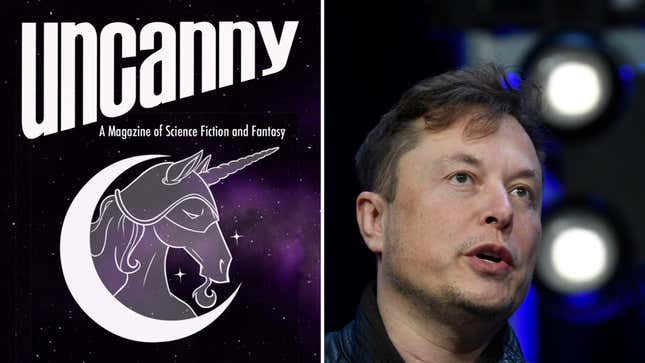A Twitter Exodus Could Mean the End of Some Online Magazines
“The death of Twitter would decimate the science fiction and fantasy short story ecosystem,” said Uncanny Magazine co-publisher Michael Damian Thomas.
In Depth

Since Elon Musk bought Twitter last Friday, he’s changed his Twitter bio to “Twitter Complaint Hotline Operator” (cringe), haggled with renowned authors on the price of blue checks, and fired some of the social media site’s top executives. As a result, celebrities have threatened to leave, with figures like Shonda Rhimes being one of the first to ditch the platform entirely. While chaos continues to brew, many users are joking about where to find them (LinkedIn, Goodreads, and Quizlet to name a few) once Twitter is in the rearview.
But for some, simply migrating to a new platform isn’t just a minor annoyance. Online publications that depend on the social media site for their community’s longevity worry that a potential Twitter shutdown could be a fatal turn. “We could lose like a third of our readers right there,” Uncanny Magazine co-publisher and co-editor in chief Michael Damian Thomas told Jezebel. Thomas had originally expressed their concerns in a tweet from earlier this week, arguing that “the death of Twitter would decimate the science fiction and fantasy short story ecosystem.”
Uncanny is a science fiction and fantasy (SF/F) publication that features poetry, fiction, and non fiction by writers from around the world, which Thomas runs with their partner, Lynne Thomas. Since its start in 2014, the publication has won a number of awards, including the esteemed Hugo Award, which they won six different times. Unlike the print magazines that dominated the 90s and early aughts, the online publications that gained traction in the 2010s worked to democratize the literary publishing industry, shirking exorbitant printing costs and widening accessibility and circulation to wider reaches. “[If you] have a community, and people love your idea and support the concept behind it, you can find people to make that thing come true,” Thomas told Jezebel.
-

-

-

-

-

-

-

-

-

-

-

-

-

-

-

-

-

-

-

-

-

-

-

-

-

-

-

-

-

-

-

-

-

-

-

-

-

-

-

-








































